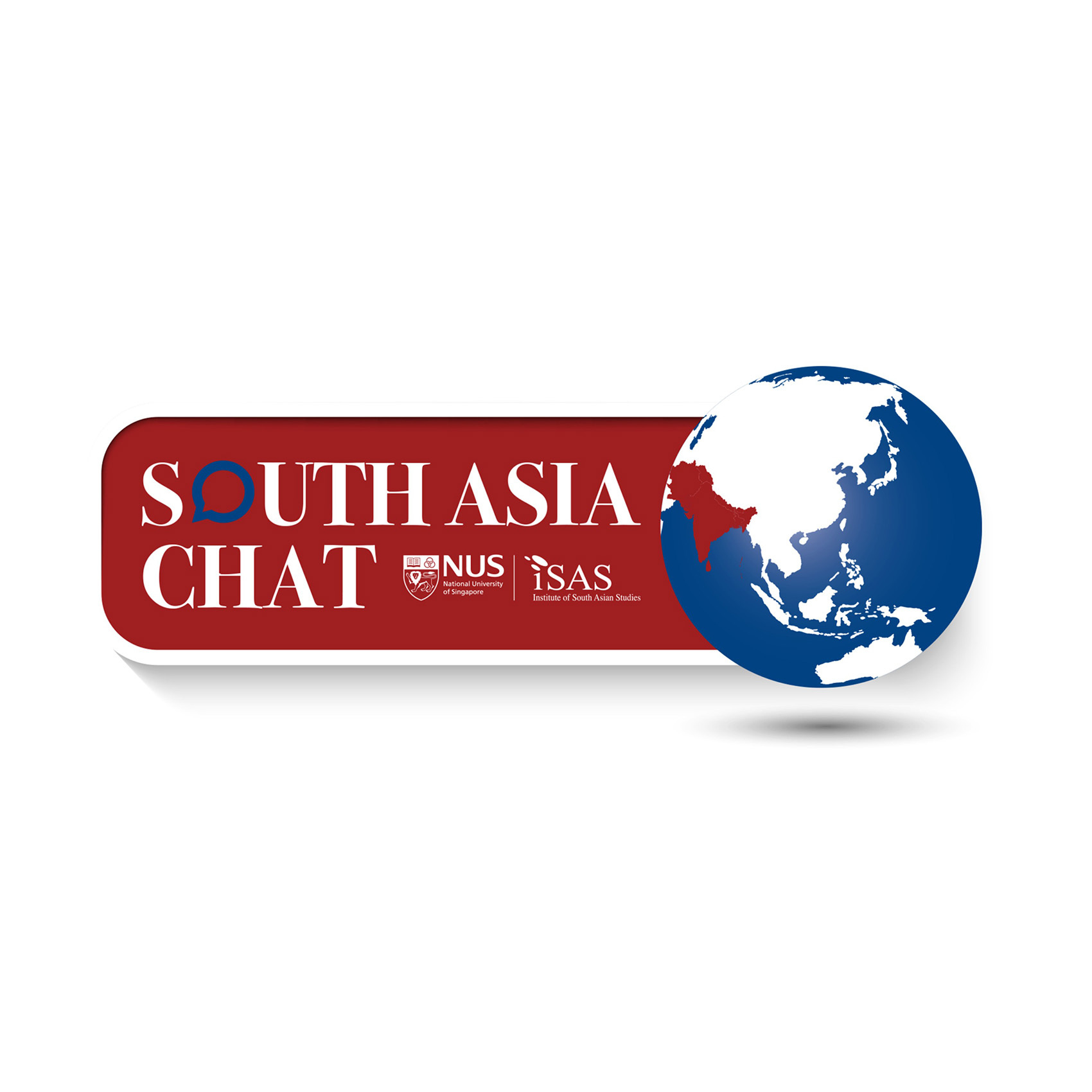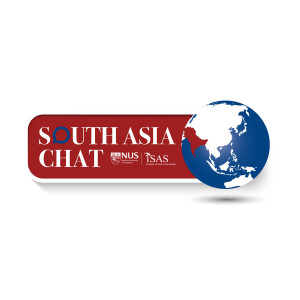
125.4K
Downloads
318
Episodes
South Asia Chat podcast series will feature conversations with analysts, academics and thought leaders on topical issues impacting South Asia.
South Asia Chat podcast series will feature conversations with analysts, academics and thought leaders on topical issues impacting South Asia.
Episodes

Tuesday Dec 14, 2021
Episode 117: US-India Trade Ties
Tuesday Dec 14, 2021
Tuesday Dec 14, 2021
In late November, the United States Trade Representative (USTR), Katherine Tai and her deputy, Sarah Bianchi, met India’s Minister of Commerce and Industry, Piyush Goyal and Commerce Secretary B V R Subrahmanyam. To understand the implications of this visit on India-US bilateral ties as well as the impact on the region as a whole, Ramita Iyer, Research Analyst, ISAS spoke to Dr Amitendu Palit, Senior Research Fellow and Research Lead (Trade and Economics), ISAS.

Tuesday Dec 07, 2021
Episode 116: Repeal Of The Farm Laws
Tuesday Dec 07, 2021
Tuesday Dec 07, 2021
After year-long protests by farmers from Punjab and western Uttar Pradesh, on 19 November 2021, the Indian Prime Minister Narendra Modi announced his government’s decision to repeal the three controversial farm laws. These were withdrawn on the first day of the winter session of Parliament, sparking a debate on whether this decision was political motivated due to the forthcoming assembly elections in the two states or was it a win for democracy. It also raised questions on the future of agriculture and other economic reforms in the country? Nithya Subramanian, Editor at ISAS, discussed various aspects of this decision with Mr Subhomoy Bhattacharjee, Senior Adjunct Fellow at RIS India and Consulting Editor, Business Standard.

Tuesday Nov 30, 2021
Episode 115: Connectivity Creates Conflict
Tuesday Nov 30, 2021
Tuesday Nov 30, 2021
Dr Mark Leonard, Co-founder and Director of the European Council on Foreign Relations discusses his latest book The Age of Unpeace: How Connectivity causes Conflict with Nithya Subramanian, Editor, ISAS .This book argues that although there is greater connectivity today be it via trade, technology, the internet or travel, these are also giving countries a reason to fight one another and an arsenal of new weapons, from cyber-attacks and sanctions to fake news and weaponised vaccines.

Tuesday Nov 23, 2021
Episode 114: The Second Quad
Tuesday Nov 23, 2021
Tuesday Nov 23, 2021
Last month, the foreign ministers of Israel and the United Arab Emirates met the US Secretary of State, Antony Blinken, in Washington DC. In less than a week later, the Indian External Affairs Minister joined them for a virtual meeting, which has resulted in a new grouping, popularly called the Second Quad. How will this bloc be different from the Indo-Pacific Quad and what benefits can India accrue from it? Nithya Subramanian, Editor, ISAS, spoke to Prof P R Kumaraswamy, who teaches contemporary Middle East at the Jawaharlal Nehru University in New Delhi.

Tuesday Nov 16, 2021
Episode 113: India Resumes Vaccine Diplomacy
Tuesday Nov 16, 2021
Tuesday Nov 16, 2021
Last month, the Indian government announced the resumption of its Vaccine Maitri initiative, an ambitious exercise to export vaccines to neighbours and key partners. While the initiative was first launched in January 2021, it was quickly suspended in April 2021 due to an unprecedented rise in domestic infections. To understand more about the background and the implications of restarting vaccine diplomacy, Ramita Iyer, Research Analyst, ISAS spoke to Dr Karthik Nachiappan, Research Fellow, ISAS. Dr Nachiappan's research focus includes India and global health.

Tuesday Nov 09, 2021
Episode 112: Politics of Recognising the Taliban
Tuesday Nov 09, 2021
Tuesday Nov 09, 2021
Ever since the Taliban took over Kabul in August this year, it has been trying to engage with the international community to seek recognition. The interim Taliban government made many promises but failed to deliver particularly in matters of political inclusion, religious tolerance and rights of women, presenting many challenges to the international community in dealing with it. Dr Matthew Nelson, Associate Professor - Islam and Politics in South Asia, Asia Institute, the University of Melbourne not only provided a historical perspective, but also discussed whether there is pressure from religious groups within Pakistan, Saudi Arabia and other Muslim majority countries to recognise the Taliban.

Tuesday Nov 02, 2021
Episode 111: Lakhimpur Kheri Violence
Tuesday Nov 02, 2021
Tuesday Nov 02, 2021
The violence in Lakhimpur Kheri on 3 October 2021 led to the death of eight people, including four farmers. The subsequent arrest of Ashish Mishra, son of Minister of State in Ministry of Home Affairs Ajay Mishra, with murder charges in connection to the violence has resulted in intense politicking. To discuss the incident and its implications on the upcoming state elections in Uttar Pradesh early next year, Dr Ronojoy Sen, Senior Research Fellow and Research Lead (Politics, Society and Governance) at ISAS spoke to Dr Gilles Verniers, Assistant Professor of Political Science, Ashoka University and Co-Director, Trivedi Centre for Political Data. He is also a Senior Visiting Fellow at Centre for Policy Research.

Tuesday Oct 26, 2021
Episode 110: Civil-Military Discord
Tuesday Oct 26, 2021
Tuesday Oct 26, 2021
In early October, the Pakistan Army's media arm announced the appointment of Lieutenant General Nadeem Ahmed Anjum as the new Chief of the Inter Services Intelligence taking over from Lieutenant General Faiz Hameed, who had been posted as the Peshawar Corps Commander. However, despite the passage of days, the notification confirming the new appointment has not be issued by Prime Minister Imran Khan's Office highlighting a strain in the relationship between the civil and military institutions. Dr Ayesha Siddiqa shared some insights into this development. She is a Non-Resident Fellow at ISAS, besides being a Senior Fellow at the Department of War Studies, King's College London and author of Military Inc: Inside Pakistan's Military Economy.

Tuesday Oct 19, 2021
Episode 109: Political Chaos in Punjab
Tuesday Oct 19, 2021
Tuesday Oct 19, 2021
Punjab has witnessed hectic political activity in the past few weeks after its chief minisiter, Amarinder Singh, resigned citing continued humiliation by the central Congress leadership. He has been replaced by Charanjit Singh Channi while former cricketer-turned-politician Navjyot Singh Sidhu remains the president of the Punjab Pradesh Congress Committee. To explain these developments and the implications it will have on the state politics, we spoke to Dr Ashutosh Kumar, Professor and Chairperson at the Department of Political Science, Panjab University.

Tuesday Oct 12, 2021
Episode 108: Sri Lanka‘s New Strategy In India
Tuesday Oct 12, 2021
Tuesday Oct 12, 2021
In July 2021, Sri Lanka released a new Integrated Country Strategy 2021/2023 for its diplomatic missions in India, with an overarching goal to continuously maintain the momentum of the existing partnership between both countries and to elevate it to the level of a "special relationship". The document lays down seven mission goals including strengthening bilateral ties, increasing foreign investment, enhancing connectivity, promoting ocean resources and expanding strategic and cultural cooperation. To better understand the various aspects of Sri Lanka’s new strategy in India, we spoke to HE Niluka Kadurugamuwa, Deputy High Commissioner of Sri Lanka to India.
